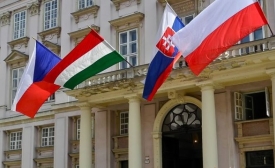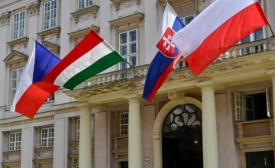hungary


Effective Central European public diplomacy means opening up to new partnerships.
The chamber in the Municipal Court of Budapest was packed, observers crammed into sweaty overflow rooms staring at closed circuit television screens and anxiously awaiting the verdict. As these rooms filled, an unwieldy queue formed outside as an incongruous gaggle of journalists, victims' family, and some skinhead supporters of the accused implored court officials to let them in to hear the verdict. Arpad Kiss, his brother Istvan, their friend Zsolt Peto, and accomplice Istvan Csontos stood dead-eyed in front on the judge, flanked by masked policemen.
Rita Csapó-Sweet grew up a first-generation Hungarian-American. Her parents came to the United States after World War II. Because of her ethnic background, she felt a little out of place growing up in America. But a college trip to Hungary remedied her feelings of alienation and carved out a path that saw her become a cultural ambassador of sorts.
The most recent installment in the CPD Perspectives series, "Cases in Water Diplomacy" is an edited volume of six case studies in water diplomacy. Released on the heels of the 10th annual World Water Day (observed March 22nd, as mandated by the United Nations General Assembly), this collection highlights the ever-growing importance of strategic water diplomacy in all regions of the world.
Taipei-based Hungarian diplomat Levente Szekely is using his rare talent to introduce Hungarian arts to Taiwan, hoping to promote closer music and art ties between the two countries. The 53-year-old representative of the Hungarian Trade Office in Taipei shot to fame in Taiwan's diplomatic circles after showcasing his professional violin skills at a Hungarian National Day party held by his office in October.
Cultural and linguistic boundaries blurred as Rabindranath Tagore's poetry was set to a dance and Hungarian poetry composed by national icons like Endre Ady was recited in Hindi and in Hungarian. All this when 15 poets and writers from the two countries assembled here under the "Poetry Across Cultures" to read and exchange over musings of love, cadence and friendship.
With the fall of Hungary’s Western-style, pluralistic democracy, the time is right for the United States to reinstate Radio Free Europe’s Hungarian-language broadcasts. Hungarian would then join 28 other languages in which RFE transmits its programs on radio stations in countries of the former Soviet Union, the Middle East, South Asia and the Balkans.







